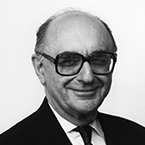
Enrico Mihich, MD, presidential scholar and special assistant to the president for sponsored research at Dana-Farber Cancer Institute in Boston, Massachusetts, died December 29, 2016, at the age of 88. Mihich, AACR past president and fellow of the AACR Academy, spent most of his long career at Roswell Park Cancer Institute in Buffalo, New York.
Mihich achieved distinction for his studies examining the interactions of drugs with the immune system. He was the first to demonstrate that the therapeutic effects of certain anticancer drugs and cytokines are dependent upon the drug-induced modulation of the immune responses against the tumor. He was also the first to show that resistance to certain anticancer drugs was associated with an increased immunogenicity of the resistant cells. He later discovered TIP-B1, a protein that inhibited cell death when incubated with TNF-α. He also showed that inhibition of polyamines resulted in antitumor effects. In addition to these fundamental studies, Mihich is well known for developing therapeutics and brought several drugs into clinical trials, including methylglyoxal-bis-guanylhydrazone.
Mihich first joined the AACR in 1958. In addition to serving as president (1987-1988), Mihich was a member of the AACR board of directors (1985-1990), program chair of the AACR Annual Meeting in 1978, Cancer Research editorial board member (1981-1988), member of the Clinical Research and Experimental Therapeutics Awards Committee (2004-2005), AACR-Women in Cancer Research Charlotte Friend Memorial Award Lecture Committee (2002-2003), International Affairs Committee (1990-1992), New York State Legislative Committee (1998-2000), and an AACR representative to the International Union Against Cancer (1998-1999). He was featured on the June 15, 1993, cover of Cancer Research.
During his AACR presidency, Mihich formed task forces for membership and activities development in experimental therapeutics, endocrinology, clinical investigations, molecular biology, and virology. The recommendations of these task forces resulted in a broadening of the content presented at the Annual Meeting through an increased number of major symposia. Mihich also chaired a steering committee to develop the concept of small AACR scientific meetings; as a result, the first AACR Special Conference took place under his successor, Lawrence A. Loeb, in the fall of 1988.
His worldview of cancer research led to many international scientific collaborations, including the establishment of the Pezcoller Foundation-AACR International Award for Cancer Research in 1997, a partnership that continues today. He served on the award selection committee (1997-2001 and 2011-2012) and as chairman of the Pezcoller Symposium Committee (1989-2008). He also cochaired the first AACR-Japanese Cancer Association joint meeting in 1989.
At Roswell Park Cancer Institute, Mihich served as vice president for Sponsored Programs and director of the Department of Experimental Therapeutics and Grace Cancer Drug Center. Additionally, he served as chairman of the Program of Molecular Pharmacology and Cancer Therapeutics at the Roswell Park Division of the Graduate School of the State University of New York at Buffalo.
In 1984, President Ronald Reagan appointed Mihich to the National Cancer Advisory Board, on which he served until 1990. He also served on the Board of Scientific Advisors of the National Cancer Institute (NCI) from 1996 to 2004.
Mihich was inducted into the inaugural class of Fellows of the AACR Academy in 2013. Other prestigious recognitions throughout his career include the Director’s Service Award from the NCI, Thomas B. Tomasi Achievement Award from Roswell Park Cancer Institute, the Lifetime Science Award from the Institute of Advanced Studies in Immunology and Aging, and an honorary medical degree from Aix-Marseille University in France. Additionally, Mihich is an elected fellow of the American Association for the Advancement of Science.
Born Jan. 4, 1928, in the Italian town of Fiume (present-day Rijeka, Croatia), Mihich and his family fled to Milan after World War II to escape the Yugoslavian communist occupation. He received his medical degree from the University of Milan in 1951. He did postdoctoral work at Memorial Sloan Kettering Cancer Center and moved to the United States permanently in 1957, when he joined Roswell Park.
Be the first to add a Remembrance.